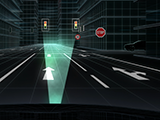- Login
- LOGIN-AREA
- Aftermarket Club
- Deutsch
Technology & Products / 08.01.2024
HELLA and TÜV Rheinland: New "Traffic Rule Engine" software for autonomous vehicles
- Software module knows the applicable local traffic regulations and thus enables autonomous vehicles to behave in accordance with the rules
- In comparison to closed systems, the "Traffic Rule Engine" can be continuously updated via over-the-air updates
- HELLA focuses on software development and the database, TÜV Rheinland provides support with type approval
01/08/2024
01/08/2024
The collaboration between the automotive supplier and the testing service provider focuses on automated vehicles with SAE level 3 and higher. Vehicles at this stage of development have a system that enables at least temporary autonomous driving. Drivers can therefore turn away from road traffic in certain situations and turn their attention to other things. in this mode, the responsibility for driving the vehicle is transferred from the driver to the manufacturer.
"When highly automated vehicles are to manage driving situations autonomously and without human intervention, they must know the applicable rules of the road at all times and be able to control them without restriction. With the Traffic Rule Engine, we are creating a powerful technological basis for this and, in cooperation with TÜV Rheinland, are completely covering the process chain from start to finish," says Kay Talmi, Managing Director of Hella Aglaia, a Berlin-based subsidiary of HELLA that specialises in software development.
For this reason, a software module is being developed that monitors the planned actions of the vehicle and compares them with the current traffic regulations based on sensor and map data. If a deviation is detected, feedback is sent to the driving system in real time. To ensure that the latest traffic regulations of a country are used at all times, the software module can be updated continuously and cost-effectively via over-the-air updates compared to closed systems.
As part of the collaboration, Hella Aglaia is focussing on the development of the "Traffic Rules Engine" with the underlying traffic rules database and the algorithm used to execute the corresponding rules. TÜV Rheinland's priorities include taking into account the approval-relevant requirements for the Traffic Rule Engine software and the type approval of automated and autonomous vehicles.
"The rapid pace of digitalisation is driving mobility forward, but at the same time it is also presenting developers, manufacturers, approval authorities and national and European legislation with new challenges," says Thomas Quernheim, Global Director Engineering and Homologation at TÜV Rheinland. "We often accompany and support innovations with our expertise long before the approval-relevant stages of the product life cycle begin. We were the first in the world to successfully achieve approvals at automation levels 3 and 4."
The "Traffic Rule Engine" will now be presented to the public for the first time at the Consumer Electronics Show 2024 (CES), which takes place from 9 to 12 January in Las Vegas. The next step will be to extend the development to various car manufacturers. Target markets are initially Europe and North America.
2024
Contact
Daniel Morfeld
Spokesperson / Media Relations
Rixbecker Str. 75
59552 Lippstadt
Phone: +49 2941 38-7566
Fax: +49 2941 38-477545
Daniel.Morfeld@forvia.com
Spokesperson / Media Relations
Rixbecker Str. 75
59552 Lippstadt
Phone: +49 2941 38-7566
Fax: +49 2941 38-477545
Daniel.Morfeld@forvia.com
11/02/2023


